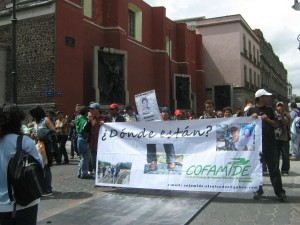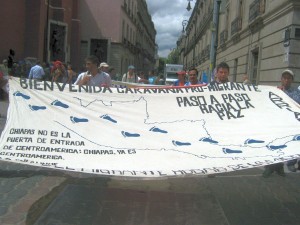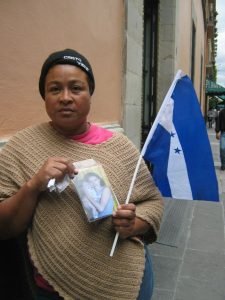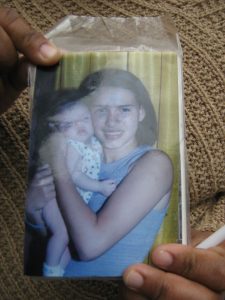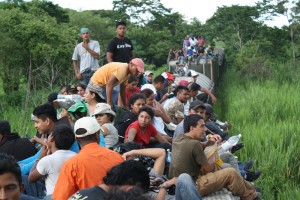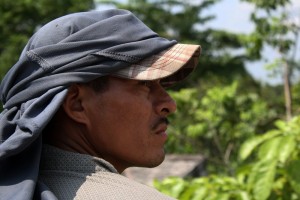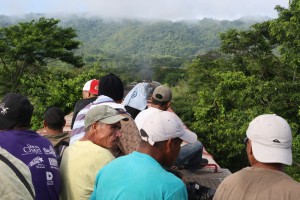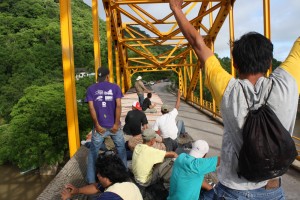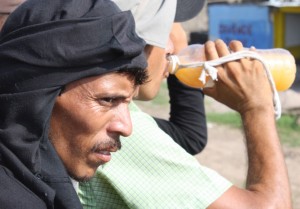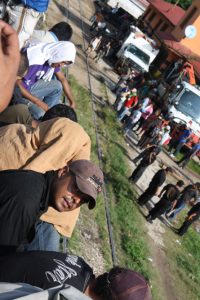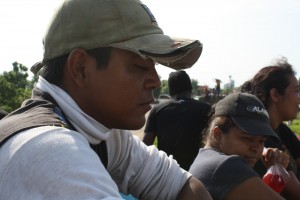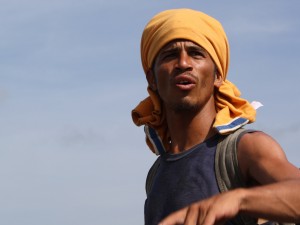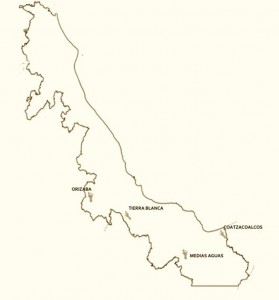
immigration

For being migrants we’re not criminals, but international workers
La Caravana Paso a Paso hacia la Paz llega al Distrito Federal
x carolina
Basta de secuestros de migrantes en su paso por México. Basta de muerte. Basta de desapariciones. Basta de tortura. Por ser migrantes no somos criminales, sino trabajadores internacionales. Queremos justicia. Queremos respeto. Queremos un trato digno. Éstas eran las demandas de la Caravana Paso a Paso hacia la Paz que llegó al Zócalo de la Ciudad de México el lunes, 1 de agosto.
¿Quiénes participaron en la Caravana? Migrantes de Honduras, Guatemala, El Salvador. Activistas. Familiares de personas secuestradas, asesinadas o desaparecidas en su tránsito por México. Directores de los albergues para migrantes. Defensores de derechos humanos. Periodistas.
Los migrantes y sus defensores marcharon al Senado de la República donde varios voceros dijeron: No venimos por la foto o para saludarles. Queremos acción. Queremos resultados. La migración no es un problema de seguridad nacional. Son los migrantes quienes no tienen seguridad. Venimos a exigir el cese a la violencia contra los migrantes, la eliminación de la visa, la asistencia en buscar a las personas desaparecidas y un trato igualitario. Exigimos un alto a la complicidad de las autoridades con los crímenes contra los migrantes. Exigimos la cancelación de la Iniciativa Mérida.
Se acordó que no estamos hablando de unos diez, veinte o cien secuestros al año (aunque esto también sería motivo de protesta). Por lo contrario, según el informe de la Comisión Nacional de Derechos Humanos de 2010, aproximadamente 20,000 de los 400,000 migrantes que transitan por México cada año son secuestrados. En algunos casos, ellos o sus familiares son extorsionados para pagar miles de dólares de rescate, mientras en otros casos, son asesinados o desaparecidos.
Organizada por el Movimiento Migrante Mesoamericano, la Caravana recorrió la ruta migrante por los estados de Tabasco, Chiapas, Oaxaca, Veracruz y Puebla hasta llegar al Distrito Federal. Un contingente salió en autobús de la capital guatemalteca el pasado 24 de julio, mientras otro contingente salió de Tenosique, Tabasco en la frontera con Guatemala el siguiente día. El segundo grupo viajó en el lomo del tren conocido como “el tren de la muerte” o “la bestia” hasta Coatzacoalcos, Veracruz, donde los dos contingentes se unieron. Llegaron juntos a Tierra Blanca, Veracruz, donde se entrevistaron con el Relator de la Comisión Interamericana de los Derechos Humanos, (CIDH). [Vean el hermoso artículo de Alejandro Reyes, “Sobre la bestia: un tren de sueños y quimeras” https://radiozapatista.org/?p=3711 ]
Cabe señalar que varios de los participantes en la Caravana han enfrentado agresiones y detenciones de personal del Instituto Nacional de Migración y policías, pero que siguen con su trabajo en apoyo a los migrantes. Dos ejemplos son el periodista Irineo Mújica Arzate y el organizador y documentalista Cristobal Sánchez. También en Puebla, el padre Alejandro Solalinde, coordinador del albergue “Hermanos en el Camino”, de Ixtepec, Oaxaca y dos de sus escoltas fueron detenidos durante media hora y acusados del transporte de armas, aún cuando los escoltas tenía permiso de portar las armas debido a la larga serie de amenazas recibidas por el padre Solalinde.
Unos migrantes hablan de sus vidas
Al platicar con unos de los migrantes que venían con la Caravana, se hace evidente que muchos van a seguir su ruta hacia el Norte.
Luis y Salvador, dos jóvenes de Guatemala afirman que no es la primera vez que pasan por México. Para Luis es la segunda vez y para Salvador la tercera.
¿Han venido con la Caravana desde Guatemala?
Salvador: No. Nos unimos en Orizaba. Tenemos dos días con la Caravana. Ha estado bonito. Ahora tengo que agarrar mi rumbo.
Luis: Sí, como sabemos que ahora hay muchos secuestros en el país, nos hemos sentido bien con la Caravana, sabiendo que nadie nos iba a molestar. De ahora en adelante, quién sabe.
¿Han tenido problemas en pasar por México antes?
Salvador: Yo, hasta ahora he caminado con la mano de Dios. Nada mal me ha pasado pero siempre está la tensión porque a muchos los han bajado del tren y nada se sabe de ellos.
Luis: A mí me asaltaron en Tapachula la primera vez que vine.
¿Alguien te ayudó?
Luis: Pues no podemos pedir ayuda a la ley porque dicen que somos “ilegales”, pero sí, me ayudaron en un albergue.
Salvador: Donde hemos tenido problemas es en Estados Unidos. De allí nos echaron. Yo me desvié un poquito de sus normas de conducta.
Luis: A mí alguien me chocó y cuando revisaron mis papeles, no tenía todo en orden.
Y ahora cuando las leyes contra los migrantes están más duras allá y hay más peligro para ustedes aquí en México ¿por qué se van de nuevo?
Luis: En Guatemala no hay trabajo. A veces comemos, a veces no. Como me gustaría estar en mi tierra con mi mamá, donde nadie me persigue, donde tengo amigos, pero no se puede. Aparte, ya tengo mi esposa en Colorado. Quiero estar con ella.
Salvador: Mi esposa y mi hija están allí en Oakland. Tengo que regresar.
El joven Leo de Honduras, también va a seguir hacia la frontera.
¿Vienes con la Caravana desde Guatemala?
No, vengo desde Tabasco, primero en tren, luego en autobús.
¿Es la primera vez que pasas por México?
No, ahora tengo la oportunidad de pisar tierra azteca por cuarta vez.
¿Cómo te ha ido antes?
Gracias a Dios, nada me ha pasado aquí. Siempre me han tratado bien.
¿Cuántas veces llegaste a Estados Unidos?
Una vez.
¿La migra te agarró aquí en México?
Sí. Andaba en autobús y me pidieron mis credenciales. Me encontraba sin dinero ese día y me dijeron que me bajara. Entonces, cada vez que me devuelven a mí país, regreso a México para ir al Norte. Me fue más o menos bien en Estados Unidos y puedo ganar la vida allá. En Honduras, es mucho más difícil.
¿Por qué te uniste a la Caravana?
Porque si nosotros no hacemos escuchar, nadie va a poner atención a los problemas que tenemos. Ya es tiempo que le ponga un alto a todo esto. Secuestran a mucha gente y nos roban mucho. Hay familiares a quienes les han sacado $25,000 dólares. Amenazan a la gente y tienen miedo que vayan a matar a un hijo, a una hija, por eso les dan el dinero. Derechos humanos debe poner fin a esto. Y la violencia se está incrementando. Es una ola de violencia muy fuerte en contra del migrante. Si nosotros no venimos a protestar, esto va a seguir así porque al rico no le interesa lo que pasa al pobre.
¿Cómo está la economía en Honduras después del golpe de Estado?
Peor que nunca ahora que estamos siendo gobernados por un Presidente que es narcotraficante. Es un problema grave que tiene Honduras.
¿Lobo?
Pepe Lobo es narcotraficante. Sólo está pensando en la gente cercana a él. No está pensando en la comunidad, en el pueblo. A él no le interesa eso.
Entonces ¿no es posible encontrar trabajo en Honduras ahora?
Mira, hay un problema muy fuerte. No hay trabajo. Hay mucho sicariato. Matan a mucha gente. Hay mucha extorsión. La droga es como pan caliente. Se vende en la esquina. Antes no se veía esto. La gente se va de Honduras porque no hay oportunidades. Si llegas a una compañía maquiladora que hace ropa, verás que llegan 1,500 personas y ellos sólo contratan a 20 personas al día. ¿Qué significa esto? Sólo 3% tendrá empleo. Es pésimo. Tengo miedo que Honduras quede como Haití. El gobierno no quiere ayudar. Sólo quiere mamar la teta. Pepe Lobo dice al mundo que Honduras se está recuperando. Pero es una gran mentira. No. Honduras está perdida.
¿Cuáles son tus expectativas de esta Caravana?
Que nos ayuden y más que nada, que ayuden los que vienen en camino. Son muchos. No sólo centroamericanos, sino suramericanos. Por ahora la Caravana me ha dado más seguridad. A ver qué va a pasar ahora.
Doris, también es de Honduras. Aparte de sumarse a la Caravana para lograr cambios para todos los migrantes, tiene una motivación muy personal para participar: Su hija y su nieta están desaparecidas.
“Vengo desde Guatemala. Nosotros íbamos a salir el 22 de julio de Honduras. Supuestamente nos iban a brindar el transporte pero no nos dieron transporte. Nos dejaron burlados. Entonces salimos el sábado por la tarde y lo que tuvimos que hacer fue pararnos frente a la Catedral a recolectar dinero para pagar un autobús que nos trajera a la frontera de Guatemala. Al principio éramos 80 pero todos no pudieron venir por falta de dinero”.
“Mi hija está desaparecida. No sé nada de ella. Aquí tengo su foto. Está con su bebita, recién nacida. Ahora ha de tener siete años. Mi hija salió de Honduras con una amiga en julio del 2004. La última vez que su amiga la vio fue en Tapachula. Esto me lo sé porque la migra regresó a la amiga y yo platiqué con ella. Ella me dio un número. Llamé a este número y mi hija me contestó pero yo la sentí bastante preocupada, bastante tensa. No quiso hablar conmigo y más bien cortó la llamada. Desde entonces no he vuelto a tener comunicación con ella. Entonces, yo pienso que ha sido víctima de trata”.
“Sí, es muy duro, por eso nosotros, con las esperanzas de encontrar a nuestros familiares, nos hemos unido a la Caravana. Es triste y muy difícil vivir con esto. Ahora me siento bien estando en la lucha. Aún si encuentro a mi hija, voy a seguir en la lucha porque no podemos parar. Tenemos que seguir hasta lograr nuestro propósito”.
“Nuestros familiares han salido de Honduras con el sueño americano, pero hemos visto que no es un sueño, sino una pesadilla. Los migrantes son víctimas de secuestros, de violaciones, de robos. Han tenido un sufrimiento terrible. A raíz de que vienen de migrantes, tienen que huir de las casetas de migración y al hacer esto, están capturados por gente sin escrúpulos que sólo buscan hacerles daño, lucrar de ellos. A las muchachas las venden a los prostíbulos. Y yo creo que las autoridades tienen conocimiento de esto. Entonces nosotros les exigimos que pongan sus buenos oficios y que hagan algo por nuestros migrantes. Ellos sólo quieren transitar por el país para buscar un trabajo al otro lado”.
“La situación en Honduras es horrible, muchísimo peor después del golpe. Ha habido muchos despidos de las empresas, de las fábricas, en todas partes. Y los que buscamos trabajo no lo encontramos. Es a raíz de esto que nuestra gente tiene que migrar. No venimos aquí para delinquir. Por eso pedimos seguridad”.
“ A veces se burlan de nosotros. Cuando estábamos allí en Honduras, mandaron a una señora el ataúd de su hijo, uno de los muertos de la masacre de las 72 personas en San Fernando, Tamaulipas. Le dijeron que no lo abriera, que el cuerpo ya estaba demasiado descompuesto. Pues, la señora lo veló con el ataúd cerrado, así iba a enterrarlo, pero en el último momento pidió que lo destaparan para verlo por última vez aunque no lo reconociera. Lo que encontró fue un poco de tierra, unas bolsas de nylon, y un pedacito de carne que no se sabe ni de qué era. Entonces, esa es una burla para nosotros. No es posible que estén haciendo esto con nosotros. Exigimos más formalidad y respeto porque no somos cualquier cosa, somos seres humanos. Todos somos seres humanos y sentimos dolor. Cómo es posible que después de sentir el dolor de la muerte de su hijo, sienta otro dolor por la burla que le han hecho. No podemos seguir permitiendo esto. No es posible que esto esté sucediendo. Es el motivo de la marcha. Que nos respeten. Y vamos a exigirlo hasta que lo logremos”
“Doy gracias a Dios que hemos llegado hasta aquí con la ayuda de nuestros hermanos mexicanos que han sido tan bellísimos con nosotros. Sí, ha habido unas dificultades. No nos hemos quedado en hoteles de cinco estrellas. Dormimos en el piso, pero tenemos techo. Llevamos buenos y bonitos recuerdos de México, personas tan bellísimas, igual que una señora me regaló este poncho. Vio que yo venía sin abrigo y me preguntó si no llevaba suéter y le dijo que no y me dijo ‘Toma. Yo misma lo tejí’. Le digo, ‘Ay, que Dios te bendiga. Eres un ángel’. También damos gracias a todos los medios de comunicación que nos han apoyado. Tal vez con su ayuda encontramos nuestros familiares”.
Report on the Caravan Paso a Paso Hacia la Paz
Interview on Flashpoints, Pacifica Radio, on the Caravan Paso a Paso Hacia la Paz (Step by Step Toward Peace), the migrant train from the southern Mexican border to the north and the violence suffered by Central American migrants through Mexico on their way to the US.
[podcast]https://radiozapatista.org/Audios/Flashpoints_2011_07_30.mp3[/podcast]
